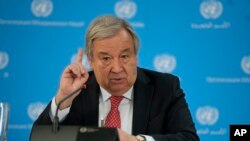U.N. Secretary-General Antonio Guterres implicitly criticized Cambodia’s upcoming elections Wednesday for failing to be inclusive, after the top opposition party was not allowed to register.
The Candlelight Party would have been the sole credible challenger to the governing Cambodian People’s Party in the July elections, but the country’s Constitutional Council last week refused to overturn a ban on its registration in a decision that cannot be appealed.
“The secretary-general reiterates that inclusive elections, in which a plurality of views and voter choices is represented, are important to engender confidence in the electoral process and underpin the ability of Cambodia’s people to exercise their democratic rights," U.N. spokesman Stephane Dujarric told reporters.
“As (Guterres) said during his visit to Cambodia last year, it is vital that civic space be open, for human rights defenders to be protected, and for civil society to play a wider role in society, all of which remain critical in preserving Cambodia’s substantial development gains and consolidation of peace,” Dujarric said.
He said: “The secretary-general reaffirms the commitment of the U.N. to support a peaceful and democratic Cambodia that fully respects the human rights of all its citizens.”
The entrenched Cambodian People’s Party has held an iron grip on power for decades and controls almost every level of government. Prime Minister Hun Sen, an authoritarian ruler in a nominally democratic state, has held his position for 38 years.
The absence of the Candlelight Party leaves only Hun Sen’s party, its allies and small parties that lack a national presence to contest the July 23 elections for the 125 members of the National Assembly.
Hun Sen's eldest son, army chief Hun Manet, is widely expected to replace his father as prime minister after the polls.
Before the Constitutional Council ruling, U.N. independent human rights investigators including Vitit Muntarbhorn, the investigator on Cambodian rights, expressed alarm at “the restrictions imposed on the right of political parties to participate in elections,” citing the election committee’s May 16 refusal to register the Candlelight Party.
After the Constitutional Council refused to overturn the election committee's decision, the U.S. State Department said it would not send official observers to witness the elections.
“Contrived legal actions, threats, harassment, and politically motivated criminal charges targeting opposition parties, independent media, and civil society undermine Cambodia’s international commitments to develop as a multiparty democracy” spokesman Matthew Miller said in a statement.
The Candlelight Party is the unofficial successor to the Cambodia National Rescue Party, which had posed a serious challenge to Hun Sen’s party before being dissolved by a controversial court ruling before the 2018 elections.
Hun Sen's party then swept those elections, winning all the seats in the National Assembly. Western nations declared the 2018 election was neither free nor fair, and imposed mild economic sanctions in response.
Most prominent opposition politicians are now in self-imposed exile to avoid being jailed on various charges they say are trumped up and unfair.








